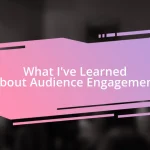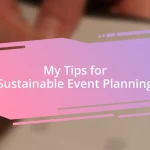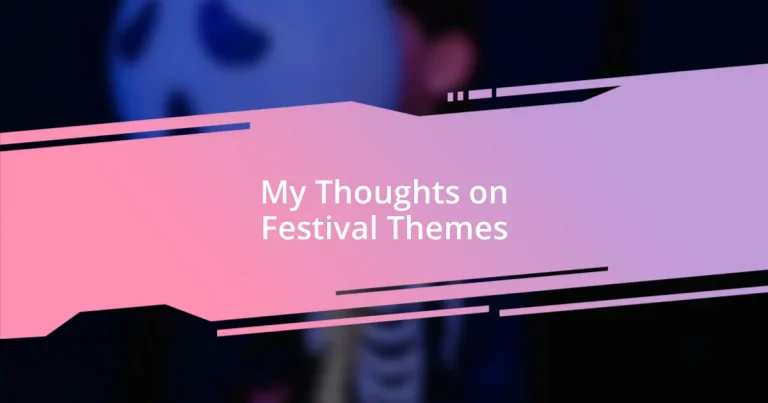Key takeaways:
- Festival themes create emotional connections and enhance attendee engagement through cohesiveness, emotional resonance, and cultural representation.
- Successful theme implementation requires collaboration, strong visual elements, and storytelling to create immersive experiences.
- Future trends in festival themes focus on sustainability, digital integration, and inclusivity to foster community and enhance overall experiences.
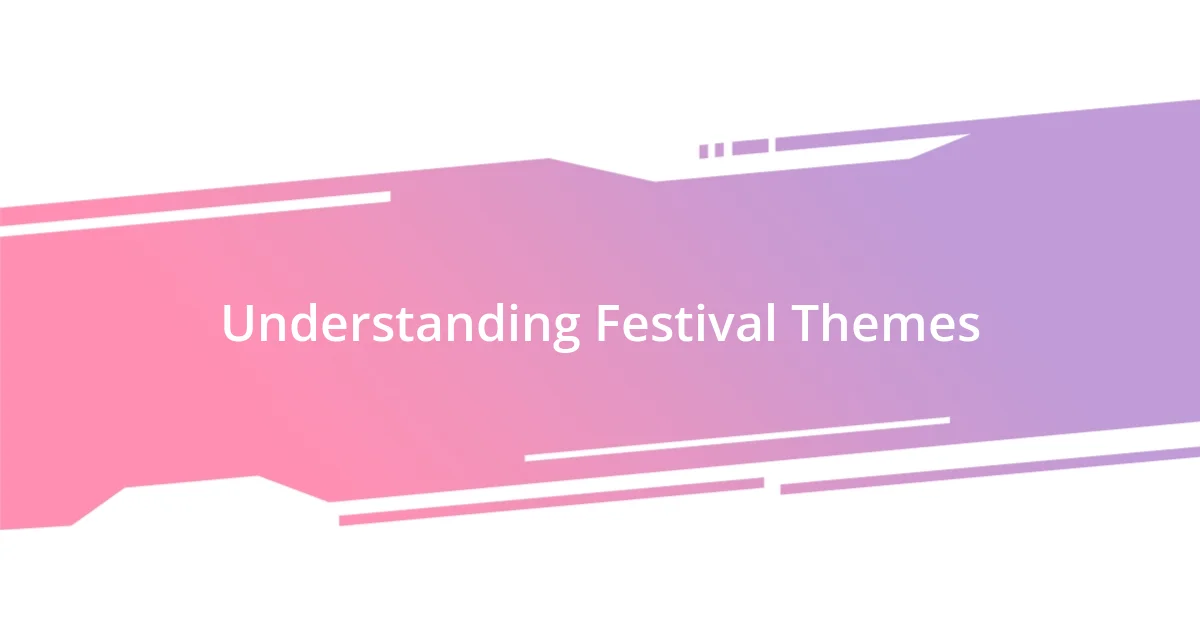
Understanding Festival Themes
Festival themes are essentially the heart and soul of any celebration, guiding everything from decor to activities. I remember attending a vibrant Holi festival once, where the theme was ‘Color of Life.’ It truly brought everyone together, illustrating how historical context and cultural significance can mold a theme that resonates with participants.
When I reflect on festival themes, I can’t help but wonder: what makes a theme truly memorable? In my experience, it’s the emotional connection it fosters among attendees. For instance, I once participated in a harvest festival themed around gratitude. The sense of appreciation in the air was palpable, turning routine festivities into moments of reflection and togetherness.
Diving deeper, I’ve seen how a well-chosen theme can elevate a festival’s overall experience. At a music festival with an eco-friendly theme, for instance, the organizers didn’t just focus on sustainability in their practices; they infused every aspect—from merchandise to food choices—with that sense of responsibility. This made each attendee feel like part of a larger movement, and I left the event with a renewed commitment to the environment. Isn’t it fascinating how a single theme can transform an entire experience?
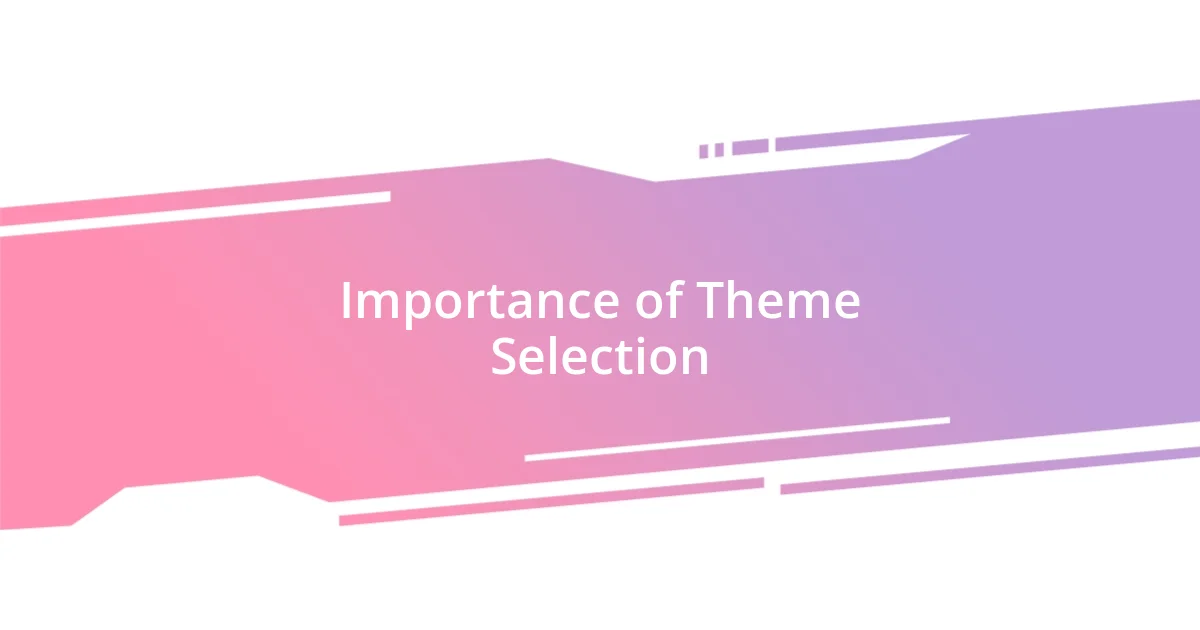
Importance of Theme Selection
The selection of a festival theme is crucial because it sets the tone for the entire event. I remember volunteering for a community festival where the theme was ‘Unity in Diversity.’ It created an incredible atmosphere of inclusivity, allowing various cultures to showcase their traditions. This not only engaged attendees but fostered a sense of belonging and appreciation for different backgrounds. When a theme resonates, it can spark connections that might never have happened otherwise.
Selecting the right theme also influences how attendees engage with various activities. For example, at a winter festival themed around ‘Illumination,’ every stall was decorated with lights that reflected the joy of the season. It evoked nostalgia for childhood memories of holiday magic and drew people to the festivities with open hearts. Here’s why theme selection matters:
– Cohesiveness: A well-defined theme ties all elements together, creating a unified experience.
– Emotional Resonance: Themes can evoke feelings that enhance engagement and connection.
– Memorability: A unique theme makes the festival stand out in people’s minds, encouraging future attendance.
– Cultural Representation: Themes can honor and celebrate the uniqueness of different cultures, fostering understanding and tolerance.
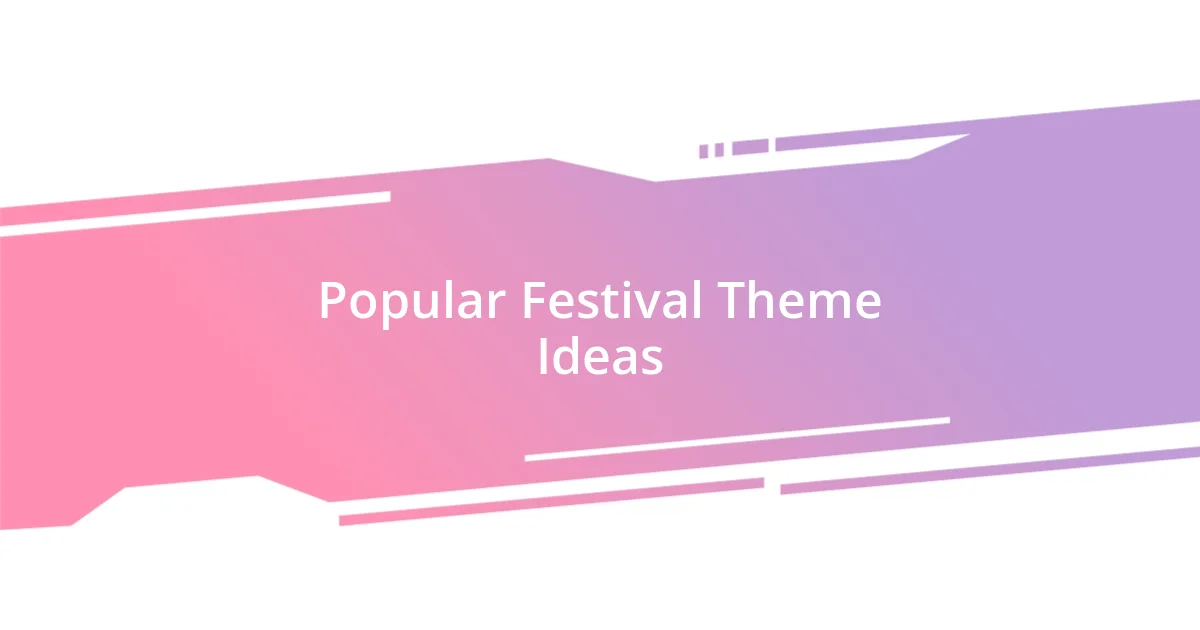
Popular Festival Theme Ideas
I find that some of the most popular festival theme ideas revolve around universal experiences. For instance, the ‘Under the Stars’ theme, which I’ve encountered at various outdoor events, invites a sense of wonder and nostalgia. I recall sitting under a starlit sky at a local music festival, where cozy blankets and fairy lights created an enchanting atmosphere. It made the night feel magical, encouraging connections among strangers who shared that same awe.
Another compelling theme I’ve encountered is ‘Cultural Kaleidoscope.’ This idea emphasizes the beauty of multiculturalism. During a street fair themed around this concept, I was amazed to see performers from different backgrounds coming together, showcasing their traditions through dance and food. It’s a remarkable way to celebrate diversity while educating attendees about various cultures—everyone left with a deeper appreciation for global perspectives.
Lastly, ‘Retro Vibes’ seems to be gaining traction, creating a delightful sense of nostalgia for many of us. At a vintage-themed festival I attended, the atmosphere was coated in shades of the past—from classic cars to retro music. It wasn’t just an event; it was a time capsule that sparked memories and conversations. It’s incredible how a theme can transport us back to simpler times, igniting laughter and nostalgia.
| Theme | Description |
|---|---|
| Under the Stars | A theme that evokes wonder, often involving outdoor settings that celebrate nighttime beauty. |
| Cultural Kaleidoscope | A festival theme focusing on multicultural representations, showcasing diverse traditions and stories. |
| Retro Vibes | A nostalgic theme inviting attendees to relive past eras through music, fashion, and decor. |
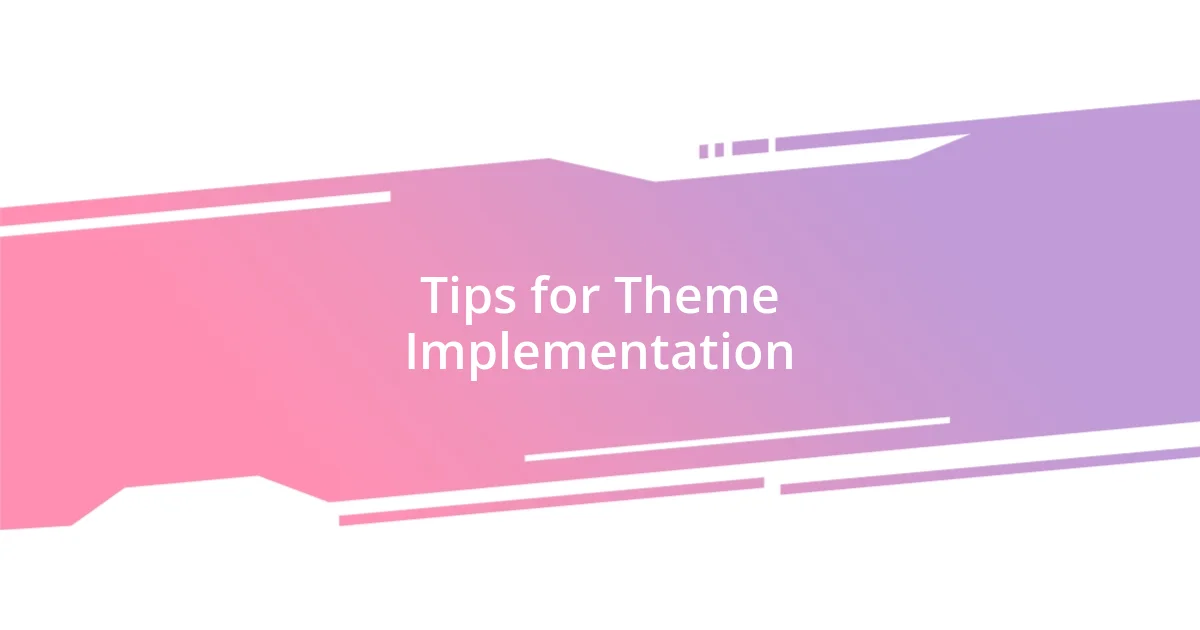
Tips for Theme Implementation
When implementing a festival theme, I’ve learned that collaboration is key. It’s essential to involve the whole team in brainstorming sessions, as diverse perspectives can lead to creative ideas. For example, during one festival planning, we gathered input from local artists, vendors, and community members. The result was a richer, more vibrant theme that truly reflected our community’s spirit. Have you ever felt that collective excitement when everyone’s ideas start to take shape? It’s energizing!
I also believe that visual elements play a significant role in theme implementation. In a past event themed ‘Whimsical Wonderland,’ we strategically used playful decorations like oversized flowers and fairy-tale signs, which transformed the venue into a magical landscape. The sheer joy on attendees’ faces as they wandered through this enchanting setup reminded me how important aesthetics are in creating a memorable experience. Utilizing colors, textures, and designs that align with your theme can elevate the atmosphere and draw people in.
Finally, I can’t stress enough the value of storytelling. Every theme has a narrative that can be woven through activities, signage, and performers. For a festival I worked on that revolved around ‘Rivers of Tradition,’ we had storytellers sharing the importance of various traditions tied to rivers across cultures. This fused education with entertainment, creating a deeper connection for attendees. Have you thought about the stories behind your theme? It can transform a simple festival into an unforgettable journey!
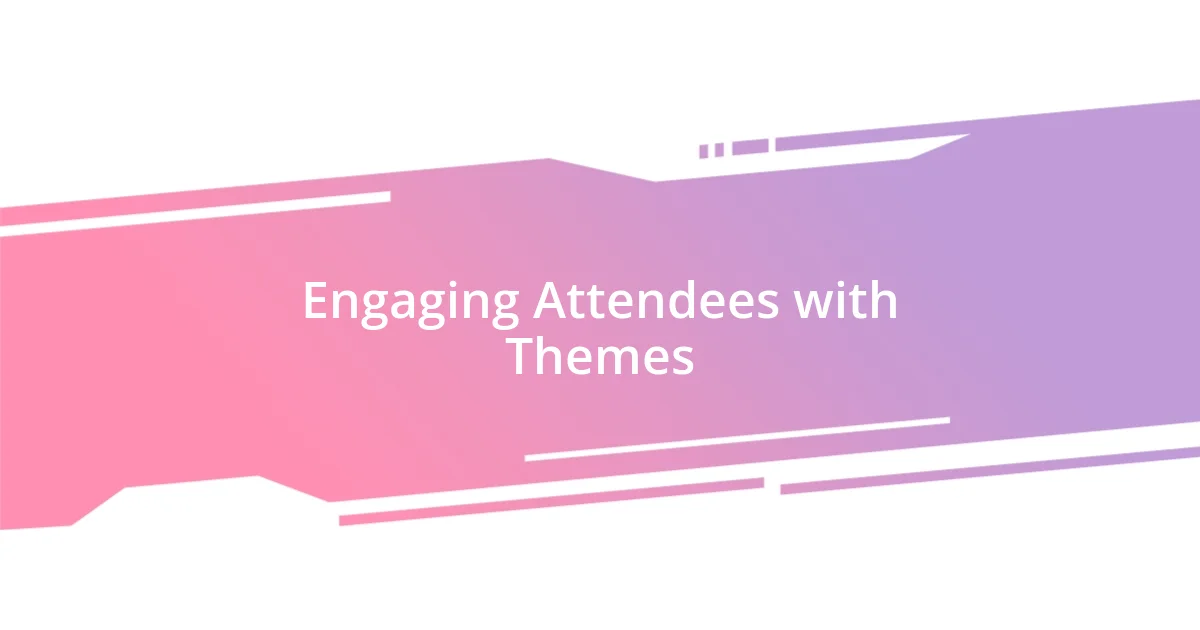
Engaging Attendees with Themes
When it comes to engaging attendees with themes, I’ve found that immersion is vital. At a festival themed around ‘Enchanted Forest,’ I remember stepping into the venue and being instantly captivated by a lush canopy of greenery and twinkling lights. The moment I felt like I had entered a different world, I realized how a well-executed theme could transform not just the space, but the overall experience of every attendee.
Incorporating interactive elements can also heighten engagement. At a recent festival focused on ‘Time Travel,’ we created zones that represented different eras, complete with period-appropriate games and activities. There was something truly exhilarating about watching attendees not only dress the part but fully embrace the spirit of each era. It makes me wonder—how often do we have the chance to step outside our daily realities and truly engage in something extraordinary?
Engaging attendees goes beyond visuals; it’s about fostering connections. At a ‘Carnival of Cultures’ event, I struck up a conversation with someone from a different country while sharing a dish we both loved. The theme created a space for dialogue and connection, demonstrating that themes can be a catalyst for deeper interactions. Have you ever experienced that spark of connection through a shared interest or theme? It’s a reminder of the power of festivals in bringing people from various walks of life together.
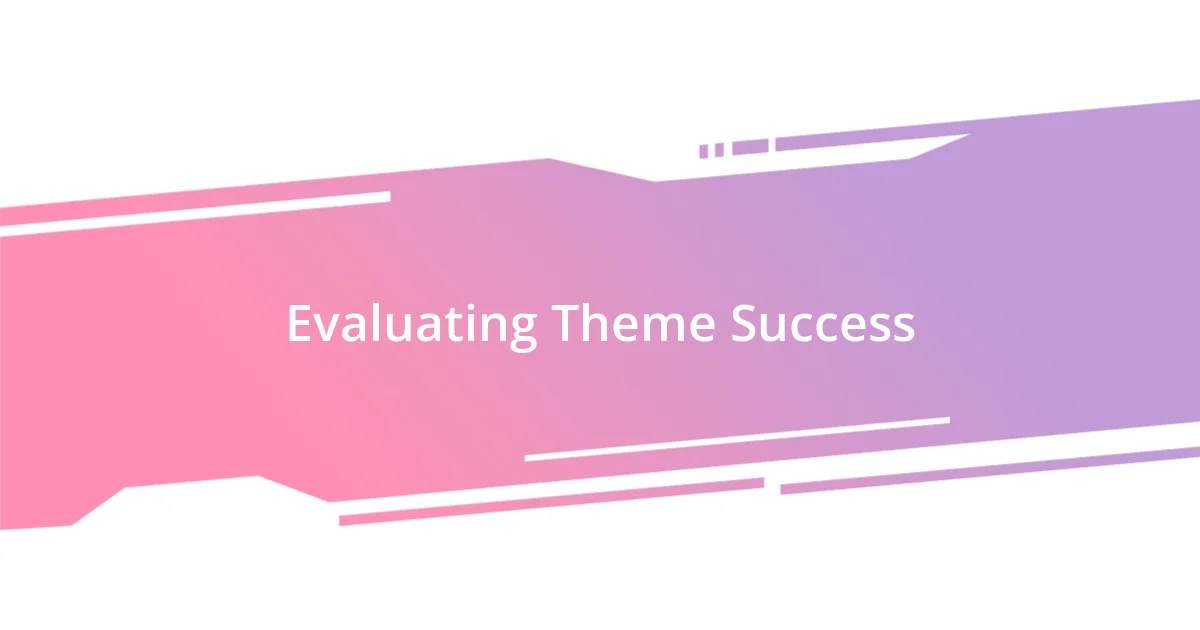
Evaluating Theme Success
Evaluating the success of a festival theme involves looking beyond just attendance numbers; it’s about gauging the emotional response of the attendees. For instance, I remember a ‘Retro Revival’ festival where the nostalgia resonated deeply with participants. Their smiles and laughter as they shared memories spurred a sense of community that clearly indicated we had struck the right chord. Have you ever noticed how certain themes can evoke powerful emotions? That connection is a direct indicator of success.
Another key criterion is feedback collection. After a vibrant festival themed ‘Colors of the World,’ we distributed quick surveys to capture attendees’ thoughts. I was pleasantly surprised by how many people mentioned feeling inspired by the diverse cultures represented. This kind of qualitative feedback provided me with insights into what worked and what didn’t, enabling us to refine our approach for future events. Isn’t it fascinating how a few questions can unlock so much understanding?
I’ve also found that social media buzz is a fascinating tool for evaluation. During a recent event dubbed ‘Mystical Journeys,’ I observed a flurry of posts and shares online. People were excitedly posting pictures, recounting their experiences, and tagging friends, which created a ripple effect that extended the festival’s life far beyond the actual days of the event. Wouldn’t you agree that the excitement felt long after the last festival day fades is a great sign of theme success?
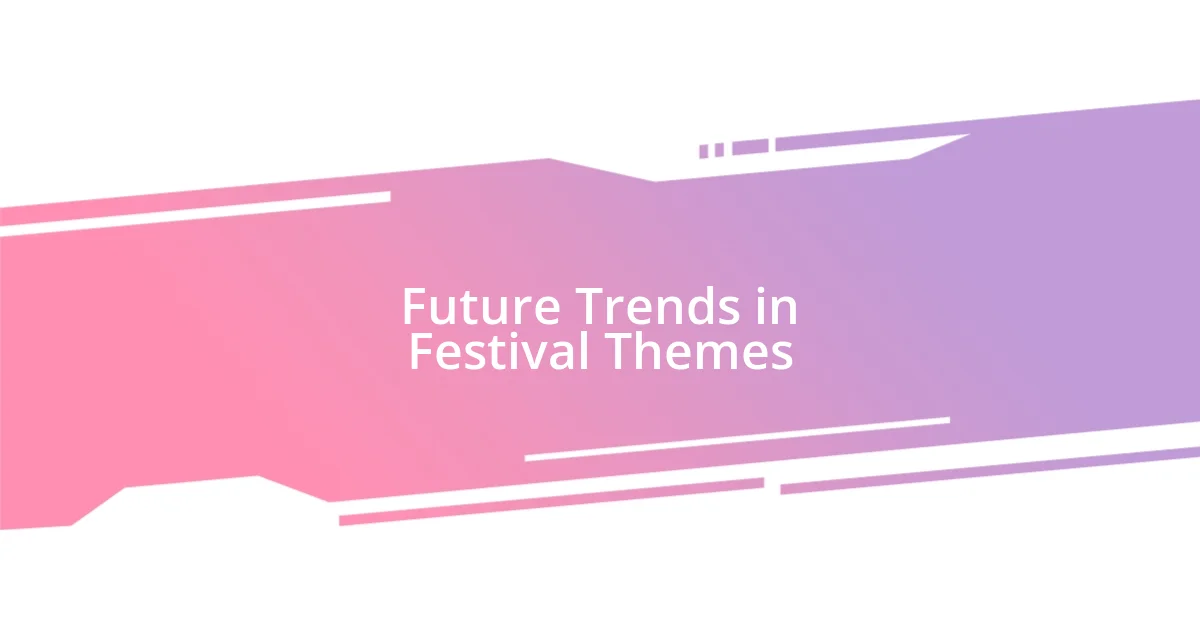
Future Trends in Festival Themes
The future of festival themes is leaning toward sustainability and eco-consciousness. I recall attending a ‘Green Earth Festival’ where every element, from decorations to food vendors, championed environmental responsibility. It was refreshing to see attendees genuinely engaged, knowing they were part of a collective effort to promote sustainability. Have you ever experienced that boost of pride from supporting a worthy cause while enjoying an event? It’s a powerful reminder that themes can shape our values and inspire positive change.
Digital integration is another trend shaping the future of festivals. I remember at a ‘Tech Wonderland’ festival, augmented reality experiences enhanced the theme significantly, allowing us to interact with virtual elements in real-time. I found myself fully lost in a digital treasure hunt that blurred the lines between reality and tech. Isn’t it fascinating how technology can elevate our experiences and redefine traditional themes? I believe that as technology progresses, festivals will harness these innovations to enrich engagement and transform how we connect.
Lastly, inclusivity is becoming paramount in festival themes. I’ll never forget the warmth and acceptance I felt during a ‘Unity in Diversity’ festival that celebrated various cultures. The organizers created an environment where everyone felt welcomed and represented through art, dance, and food from around the world. How often do we witness themes that genuinely welcome diverse voices and experiences? It seems clear to me that this future direction will not only enhance the festival experience but also foster a sense of belonging among attendees.







